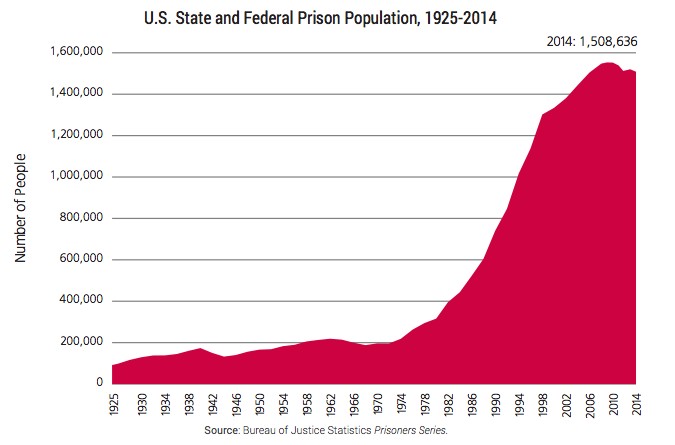How Prison Sentences in America Compare to Other Countries

By:
The U.S. has a mass incarceration problem, and one reason is that it sends people to prison for much longer sentences on average than other countries.

The Justice Policy Institute compared average sentence lengths in the U.S., the U.K., Australia, and Finland in 2011, and the report revealed the stark punishment disparity for offenders that commit the same crimes.
Drug offenders in Australia can expect to serve about three more months in prison than those in the U.S. But when it comes to robbery, assault, and fraud convictions, America hands out the longest average sentences.
.jpg?auto=format&crop=faces&fit=crop&q=60&w=736&ixlib=js-1.1.0)
That's in spite of the fact that research has turned up little evidence that imposing longer sentences makes people less likely to re-offend. A 2014 report from the National Research Center also concluded that "lengthy prison sentences are ineffective as a crime control measure."
"In terms of deterring crime, research for a long time has told us that the certainty of punishment is much more effective than the severity of punishment," Marc Mauer, executive director of the Sentencing Project, told ATTN:. "If you can increase the odds that a person will be apprehended, some people will think twice about what they're doing, whereas increasing the amount of punishment that's imposed — most people don't think they're going to be apprehended, whether it's shoplifting or murder, so they're not particularly thinking about the severity of punishment that might take place."
"So the longer sentences buy us very little in terms of determent," Mauer added.
What longer sentences are associated with, however, are larger prison populations.
There were more than 2.2 million Americans in prison in 2014. The U.S. has only 4 percent of the world's total population, but the country has about 22 percent of the world's prison population, according to the Sentencing Project.
 Sentencing Project - sentencingproject.org
Sentencing Project - sentencingproject.org
President Barack Obama made sentencing reform a key part of his criminal justice agenda, signing the 2010 Fair Sentencing Act, for example, which reduced the mandatory minimum sentencing disparity for those convicted of crack cocaine and powder cocaine offenses. It also removed the mandatory minimum sentence for possession of crack cocaine. The president has also commuted the sentences of more than 1,300 federal inmates (mostly nonviolent drug offenders) as of Tuesday.
But these reform efforts have done little to reduce the overall prison population in the U.S.
Harsh sentences imposed on drug offenders during the Drug War era have put tens of thousands of Americans behind bars in state and federal prisons. And lengthy sentences for most violent and nonviolent crimes haven't budged in recent years.
